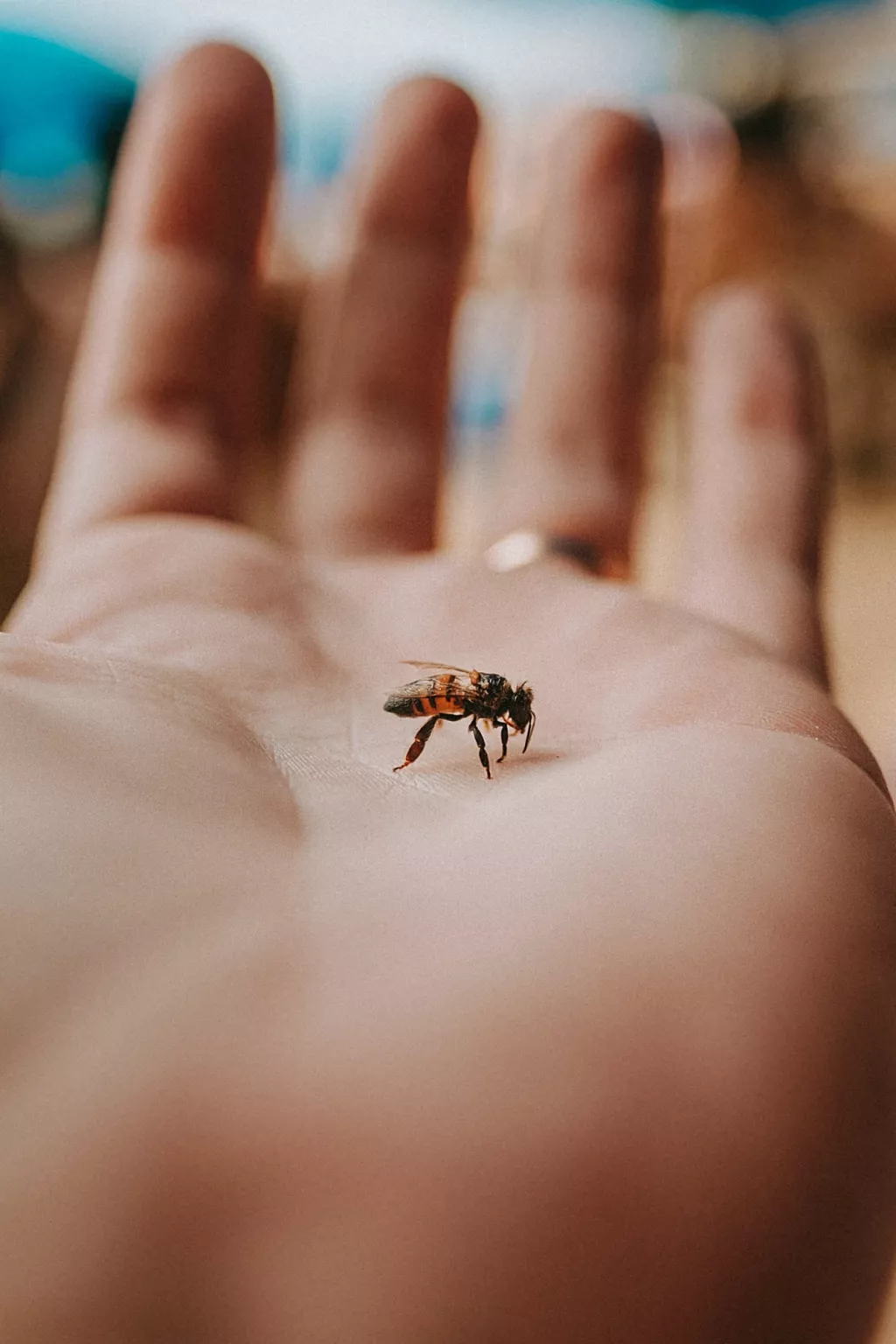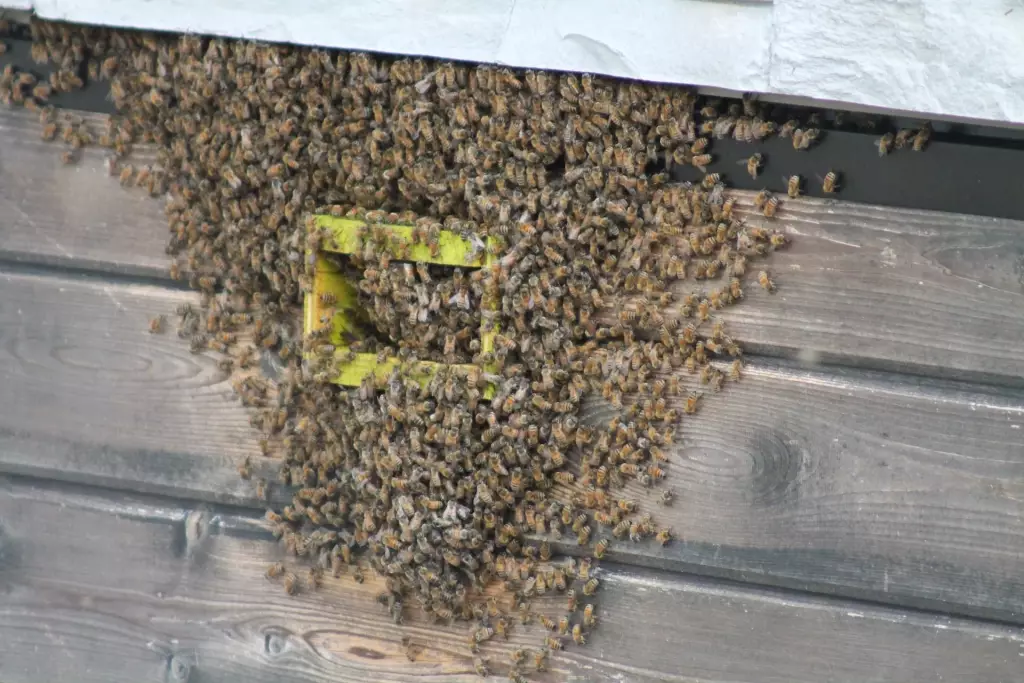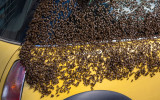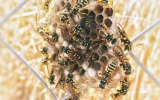How To Make Bees Go Away Without Killing Them
Bee removal can be difficult for any homeowner. They’re regarded as crucial insects in the ecosystem, and it’s best not to kill them at all. But if you’ve got a bee problem at home, then how do you make the bees go away without killing them?
Smoke is a popular method to drive bees away without killing them. Other natural bee repellents include citronella oil, peppermint oil, vinegar spray and garlic spray.
While it isn’t illegal to kill bees, many people consider it to be morally wrong. Fortunately, there are several environmentally safe methods of bee control. Read more below to find out what they are.
Summary
- Smoking is commonly used to drive bees away without killing them.
- Peppermint and citronella oils are effective bee repellents.
- You can make natural DIY insect repellents with vinegar and garlic spray.
- To permanently ward off bees, plant bee-repellent plants around your home.
- Contact a professional if you have a bee infestation in your home.

On this page:
Make Bees Go Away Without Killing Them
Smoke
Smoke is the go-to method for driving bees away. Beekeepers often use metal cans called bee smokers to generate smoke. The smoke blocks the pheromones that bees use to communicate with each other. It disorients them and may make it more difficult for them to find their way back to their hive. This makes them less aggressive as well, making it easier for beekeepers to safely remove honey during honey harvest season.
Citronella
Although not as effective as smoke, you can use citronella candles or oils to drive away bees. It mostly acts as a natural insect repellent. Its citrus-like smell can be unpleasant for bees and other flying insects. Lemongrass plants are also optional; however, their effectiveness would depend on the concentration and proximity of the bees to the source of the smell.
Peppermint
Peppermint oil is another alternative for repelling bees and other flying insects. It has a strong smell, which can be unpleasant for the bees. Peppermint oil also contains menthol, which is a natural insecticide that drives away bees and other insects.
You can plant peppermint around your house to act as a natural insect repellant or apply peppermint oil directly to your skin to prevent bees from coming near you.
Vinegar spray
Getting rid of bees with vinegar is another natural alternative for bee repellent. While vinegar doesn’t contain chemically harsh substances, a large dose can be lethal to bees. Spraying vinegar directly on them will fatally kill them.

To avoid killing them, you can simply spray the vinegar solution on surfaces where bees commonly visit. Vinegar is a cheap ingredient you can find in any household pantry. It’s easy to make a homemade vinegar spray with a teaspoon of vinegar and a quart of water. However, its effectiveness as a bee repellent can be limited. It’s not a completely reliable way to drive away bees.
Once the smell wears off, the bees may come back, so you’ll have to reapply the vinegar spray against surfaces to prevent the bees from coming back.
Garlic spray
Garlic spray is a promising alternative to bee repellents. Crushed garlic has a strong smell that repels bees. According to research by Auburn University in Alabama, applying garlic and other organic pest repellents reduced the presence of certain insects, such as bees.
It’s easy to make a garlic spray, and you can choose how concentrated you want the solution to be. To make a highly concentrated solution, you need 2 bulbs of puréed garlic and a half cup of water. For a weak garlic solution good for preventive methods, you’ll need about six cloves of garlic and 1 gallon of water.
To extract the garlic juice, you need to crush the garlic or purée it. Put it in a bowl, pour boiling water on it, and leave it overnight. Afterward, strain the garlic and put the water into a spray bottle to avoid garlic bits clogging the nozzle.
How to Prevent Bees From Coming Back
You already know what naturally repels bees, so how do you prevent them from coming back? There are some remedies to make sure bees don’t end up in your backyard. If you’re a green thumb, planting bee-repellent plants around your house and in your yard will let bees know this isn’t a good place for them to forage for food.
Another remedy is to make a DIY insect repellent spray. With a variety of common household ingredients, such as those mentioned above, you can concoct a safe and natural bee repellent. Just spray it around the surface of your house, your outdoor plants, and outdoor furniture every once in a while to persistently keep bees away from you and your home.

Lastly, regularly check for beehive nests around your house. You never know that wild bees have taken up residence in your home until they attack you. These nests could be anywhere and in any space they can find. Be it under floorboards, behind walls, inside the ceilings, inside the garage, or in sheds.
In such a situation, you’ll need to call a bee professional and have them remove the hive without killing the bees.
Why You Might Want to Get Rid of Bees
Bees are considered one of the keystone species because of their strong impact on our community. We depend on them to help us grow our food, pollinate the crops, and even produce honey, which is considered a superfood. So why would we want to get rid of bees?
For one thing, bees are an annoying and troublesome pest if they’ve taken up residence in your home. If left unchecked, their hive can cause damage to your home that will cost you a lot of money to repair.
Second, bees will sting you when provoked or disturbed. It’s difficult to enjoy the outdoors when you might be visited by a swarm of angry bees. It can be stress-inducing to always keep your eyes alert for signs of bees around your home.
Third, a family member might be allergic to bee stings. It’s important to keep your family safe and avoid the risk of being stung and going into anaphylactic shock. That can be a traumatic experience for the family.
Fourth, honey attracts other insects and pests. The high sugar content of honey makes it an attractive food source for a variety of insects and small mammals such as ants, cockroaches, wasps, beetles, wax moths, and mice respectively.
Overall, it’s generally not recommended to kill bees, since they are an important and vital part of the ecosystem. Growing bee-repellent plants such as citronella and peppermint around your home is your best bet to keep bees away from your home without killing them.
Are bees afraid of you?
As most parents will say to their kids, “they’re more likely afraid of you than you are of them.” But with bees, is that true?
Studies show that bees don’t have the ability to sense fear. They do not have the necessary cognitive abilities. Rather, bees are more focused on building a hive, collecting honey and making sure the colony will survive through the winter.
Bees only become aggressive when they perceive someone as a threat to their home or themselves.
Here are a couple of things NOT to do around bees:
- Make any sudden movements
- Swat it away
- Wear colorful clothes
- Eat or drink sugary food
- Disturb its nest without wearing protective gear
- Jump into a body of water to escape the bees

